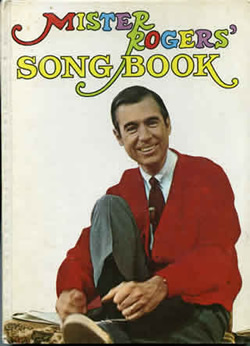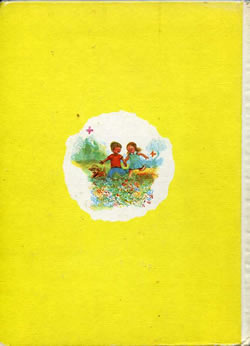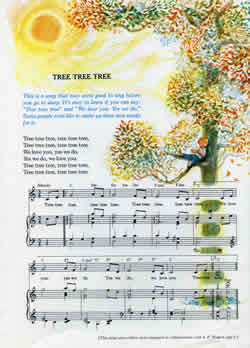Mister Rogers' Song Book
Date: 1970
Author: Fred Rogers
Illustrator: Steven Kellog
Publisher: Random House
ISBN:
Purchase: Amazon (Hardcover)


Psychological Consultants:
Margaret B. McFarland, Ph.D.,
Albert V. Corrado, M.D.
Piano arrangements by John Costa
Copyright © 1967, 1968, 1969, 1970 by Small World Enterprises, Inc.
Illustrations Copyright © 1970 by Steven Kellogg
From the Dust Jacket
Here at last is the book that thousands of Mister Rogers' fans have been asking for -- a collection of favorite songs featured on "Mister Rogers' Neighborhood," one of the most popular children's television programs ever created.
During his daily appearances on these half-hour programs, now broadcast over 197 stations, Fred Rogers explores the world of childhood with imagination, intelligence, and sensitivity. And much of his effectiveness comes from the appealing, melodic songs he has composed to assist children in their attempt to understand their feelings and those of others.
Until now these songs have been available only on the show itself or on recordings produced by Mister Rogers. But with the publication of Mister Rogers' Songbook, children and adults will be able to enjoy the songs at home together. Young fans will quickly recognize "Won't You Be My Neighbor," "You Are Special," "It's Such a Good Feeling," and all their other favorites. And their parents will gain valuable insights into such common problems as children's anger ("What Do You Do?"), sibling jealousy ("When a Baby Comes"), and social embarrassment ("The Clown in Me.").
Because the lyrics of each song have been printed separately with appealing full-color paintings to illustrate typical childhood situations, the songbook can also serve as an irresistible picture book. In addition, there are special introductory notes by Fred Rogers, expressing his personal reflections on each song.
This is truly the perfect songbook to fulfill the needs of growing youngsters and all those adults who find joy in growing with them.
Description
 The Mister Rogers' Songbook was published in the early 1970's and provided parents the opportunity to make the most of the musical works of Fred Rogers. With nineteen songs included, this book is made up of comments, lyrics, and sheet music for many of Mister Rogers' best-known songs.
The Mister Rogers' Songbook was published in the early 1970's and provided parents the opportunity to make the most of the musical works of Fred Rogers. With nineteen songs included, this book is made up of comments, lyrics, and sheet music for many of Mister Rogers' best-known songs.
The book opens with an introductory page written by Margaret B. McFarland who was regularly referenced as a psychological consultant on the Neighborhood program and on the musical albums:
"For centuries the song has expressed man's striving to create relationships between thought and feeling. The combination of melody and verbalization seems to have served the human need to make a whole of expression. Songs have dealt with many facets of human experience -- love and hostility, sadness and joy, hope and dispair, triuimph and disappointment.
"In the simple folk song, as well as in the operatic aria, one can hear the creative effort of relating feeling and thought, putting into words the affective expression of the melody. For instance, the lullaby has been a song of tender assurance of the mother's care for her child -- intended to make it possible for the little one in her arms or lap to relax into sleep. Thus the lullaby is a song of trust.
"Fred Rogers, who has written these songs for adults to sing with children, discovered as a child that music was not only a mode of affective expression but also a resource for creative channeling of inner feelings. His early realization that the song, combining as it does words and melody, can serve a child in his attempt to understand his feelings and those of others, has come to be one of the foundations of his communcations with children.
"Mr. Rogers originally composed the songs in this book for use in his television programs and recordings for children. With the publication of the Mister Rogers' Songbook, the songs are now available for parents and other adults who have responsibilities for the development of children. By the combination of simple, direct words and melodies, Fred Rogers has expressed the humaneness of the child's affective experience.
"Just as the songs of tradition have been passed on from generation to generation through interpersonal relationships, Mr. Rogers offers his songs for parents and other adults who wish to make the experience of their generation available to support the child in his striving to develop his own individuality. Growth from phase to phase is thus defined as a creative process of developing what is available in the present toward the realization of what is potential." - Margaret B. McFarland
This message is clearly directed towards the parents using this book but the focus on the song comments is geared more towards the children. At the same time though, I found it interesting as I read the comments before each song's lyrics that for one particular song, Fred Rogers seems to focus more on addressing parents rather than children. Below are the comments provided for each of the nineteen songs. Within these comments you will likely recognize some of the words spoken (word for word) on a few of Mister Rogers' LP releases.
Won't You Be My Neighbor
Neighbors are people who live close to each other. Neighbors look at each other; they talk to each other; they listen to each other. That's how they get to know each other.
You Are Special
Do you know why you're so special? Well, it's you who make your mom a mother, and it's you who make your dad a father. It's also you who make your friend a friend. There's only on YOU in thsi whole world. That's why you're special to everybody.
Everybody's Fancy
You're just the way you're supposed to be. If you are a girl, you were born a girl baby and will someday be a grown-up woman. If you're a boy, you were born a boy baby and will someday be a grown-up man. It takes men and women, and boys and girls to make the world.
Everything Grows Together
If you have a toy animal that you love and its ear comes off, this may seem scary. Especially if you should start wondering, "Could that happen to me? Could my ear just fall off like that?" But, you see, you're a person, and a person is much different from a toy. A person isn't just a lot of pieces put together; a person is all one piece. Even when you were born you had just what you needed to be who you are, and everything about you grows and grows. A person is all one piece.
Wishes Don't Make Things Come True
When you wish for something you want -- no matter how good it is or how bad it is -- just wishing doesn't make it happen. You can pretend about things, too; but pretending doesn't make things happen either. Just wishing or pretending good things won't make them come true. Just wishing or pretending bad things won't make them come true either.
The Clown in Me
When you try to tell grownups something and they don't seem to listen, or if you try to show them something and they don't seem to look, do you ever start to act silly like a clown and try in that way to get them to listen and look at you? And do you ever act silly when you're feeling shy? Some people do. People act like clowns for lots of different reasons.
You're Growing
When you were very young, you wanted to grow bigger and be able to do more and more things well. After you learned to crawl, then you tried to walk. When you could walk well, you tried to run. But to get bigger you had to give up some things you had and did when you were little. Growing means changing and people are born to grow.
Sometimes People are Good
Nobody is good all the time and nobody is bad all the time. Nobody is happy or sad all the time. Sometimes you feel one way and sometimes another.
What Do You Do?
It's hard to feel angry, especially with people you love very much. But everybody does feel angry once in a while. You know you can learn what to do with those different feelings you have inside: the loving feelings and the angry feelings.
Please Don't Think It's Funny
When you get tired from trying hard, or when things have been frightening or sad, sometimes you think you would just like to stop growing for a minute. Even when you get big, it's nice to feel again what it was like to be little, and to turn to things that are familiar and easy to do. Afterward you may be surprised to find that this has helped you to grow even more.
It's Such a Good Feeling
You can make a mud pie get bigger by putting more mud in it. You can make a block building get higher by adding more blocks. But mud pies and block buildings don't grow by themselves. Only living things grow. You grow because you're living. You're alive.
When a Baby Comes
When your mother's having a baby, it seems to take a long time for it to grow. Then, when it's finally born and you can actually see the baby, it looks so small and is not able to do much of anything. You may wonder why your mother and dad take so much time to care for the baby, because you know that bigger children love and need parents, too.
Just For Once
It's fun to have a lot of friends, but sometimes you would rather be with only one. There are times when you would like to have your mother all to yourself and other times when you would like to be with just your dad. Grown-up people often like to be alone with just one person, too.
I'd Like to Be Like Mom/I'd Like to Be Like Dad
How do people grow? Do you watch the things your mom does or your dad does? Do you ever think, "I wish I could do that"? Do you sometimes play that you can, and tell yourself that when you're all grown-up you'll be like Mom or Dad?
Children Can
Does it ever seem to you that grown-up people can do many things that children cannot do? But did you ever think about the things that children can do that grownups can't? There are lots of things that children can do.
I Like to Be Told
When exciting things are going to happen, people like to know about them and think about them. Often it's much better than having a surprise. If it's something fun, the fun lasts all the longer the longer we know about it. If it's something frightening or sad, knowing about it gives families the chance to be close when it happens. Being told gives children a chance to ask questions and to develop their own ways of coping -- a chance to prepare themselves and to feel strong. Everybody likes to be told.
** Up until this point in the book, the pre-lyric comments were clearly geared towards children; but for I Like to Be Told, Fred Rogers seems to shift his focus to the parents. Rather than simply validate any questioning feelings a child might be experiencing, parents are strongly encouraged to talk with this children and never leave them in the dark -- in good times or bad.
You're Got To Do It
Each day there's something else to listen to, something new to see and touch, something more to find out. You can learn what things are and how they work. You can ask people to help you, and you'll discover a lot for yourself.
Tree Tree Tree
This is a song that may seem good to sing before you go to sleep. It's easy to learn if you can say: "Tree tree tree" and "We love you. Yes we do." Some people even like to make up their own words for it.
** Writing and composition credits for this song are given to "J.F. Rogers, age 5" who I can only assume is one of Fred Rogers' sons -- James or John. Not knowing their middle names, it is unclear which son this refers to. On the LP Won't You Be My Neighbor, before singing Tree Tree Tree, Mister Rogers mentions that "A mother and a very young person made up this next song for me."

I'm Taking Care of You
When you're very little you need people to love you and to take care of you. As you get bigger, you yourself can begin to take care of animals and toys and you can even help with children who are smaller than you. Then someday when you're all grown-up you can be the parent who loes the little children and likes to take good care.
Notes
Mister Rogers uses this book on camera in Episode 1138, Episode 1162, Episode 1221, and Episode 1437.
Similar title but different content than the 1984 publication and the 1997 publication by the same name.
